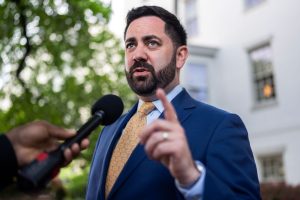The Oakland city auditor blasted Mayor Sheng Thao’s administration and Oakland Police Department leaders this week for their collective failure to apply for a grant that could have netted the city $15.6 million to combat organized retail thefts.
Calling their work “disjointed” and a “missed opportunity,” the auditor spread blame throughout the city’s government for the blown deadline that kept the city from receiving a share of the $267 million offered by the state. As a result, the auditor recommended the city adopt a policy that would help leaders in different city departments better coordinate their efforts to receive grants in the future.
“To assign blame for missing the application deadline on an administrative or technical failure overlooks deeper organizational problems with this particular grant application process,” read Acting City Auditor Michael C. Houston’s report, which was dated Tuesday.
The report comes in the wake of a blown July 2023 deadline to submit an application to the Board of State and Community Corrections, which sought to hand out millions of dollars to 34 police departments, seven sheriff’s offices and 13 district attorney’s offices for theft prevention. The money was meant to help police and prosecutors target a slew of crimes, including catalytic car thefts. It also would help go after burglary teams targeting retail outlets, and car thieves cruising neighborhoods to steal vehicles.
Last year, in the days after the blown deadline, city officials called the lapse “unacceptable” and vowed to make changes to prevent it from happening again.
This week, however, the auditor pilloried the city for its dearth of organizational leadership, its lack of project management and the absence of any grant management policy for the failure.
Even though the city knew for 73 days of the grant’s existence, its staff members weren’t fully engaged in applying for it until 16 days before it was due, according to the report. The auditor consistently blamed “a lack of communication and coordination” among city staff for that late notice, as well as for ultimately failing to submit the application within that roughly two-week span.
While some police lieutenants worked on the application, a member of the city’s Economic and Workforce Development Department separately reached out to a member of the city’s business community to discuss the idea of applying for the grant — all without first coordinating with police. Not until two weeks later did the economic and workforce development employee contact the police department to find out if they were aware of the grant.
As recently as 11 days before the grant proposal was due, city and police department staff members were emailing back and forth about new proposals. And less than an hour before the 5 p.m. deadline on July 7 to submit the application, different staff members were still trying to submit documents for the application — several of which were not uploaded successfully, the report said.
Ultimately, the auditor laid blame on the city’s leaders for the breakdown.
The mayor, for example, “could have directed or communicated to the City Administrator the importance of applying” for the grant, as well as whether to involve other departments. That’s particularly true, because such projects “need direction from the highest level” of the city’s leadership, the auditor concluded.
Yet Oakland Police Department leaders also could have done more to ensure the grant was successfully submitted, especially since Oakland interim’s police chief, Darren Allison, appeared to take responsibility for pursuing the grant shortly after the city learned of its existence.
Complicating matters was the fact that several city agencies connected to the grant application were being overseen by interim leaders at the time the city had learned of the grant, including the city’s administrator, its police chief and the director of its Economic and Workforce Development Department.
Critically, there was no project manager appointed to help shepherd the project along, the auditor’s report found, leading to “multiple parties trying to upload different sections of the application, and the ultimate failure to submit the application.”
Houston, the auditor, noted that the city has since hired a grants coordinator who is dedicated to public safety grants, as well as obtaining grant management software.
However, Houston wrote that the city also needed to adopt a policy that could “help form stronger organizational leadership, dedicated project management and improved coordination and communication for grants.”
An after-hours message left by this newspaper with the Oakland Police Department was not immediately returned.
In a statement, Francis Zamora, a spokesperson for Thao, said the mayor has taken several steps since the blown grant application deadline, including implementing a public safety strategy and putting in place an “improved” process for managing grants. Both those efforts have started to show results, Zamora added.
“Mayor Thao took responsibility for this missed opportunity in her State of the City address last October, stating ‘The buck stops with me,’” the statement said.












